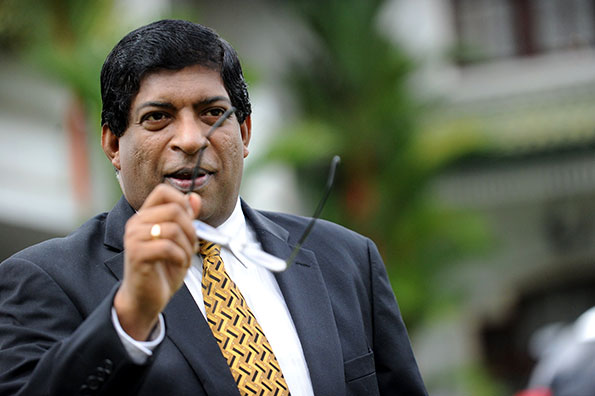By: Staff Writer
Colombo (LNW): The government’s commitment to macroeconomic stability and fiscal discipline is starting to bear fruit with stabilizing the economy and easing exchange rate pressure while inflation is on a downward trend.
These progressive measures of the fiscal and monetary authorities will prompt the International Monetary Fund’s (IMF) staff team now in Sri Lanka to reach staff-level agreement on economic and financial policies that could support the approval of the first review of the EFF-supported program.
This was stated by former finance minister Ravi Karunanayake who spearheaded the fiscal and monetary authority efforts to secure a US $1.5billion IMF loan package in 2016 aimed to reduce the fiscal deficit, rebuild foreign exchange reserves, and introduce a simpler, more equitable tax system.
Sri Lanka may have missed 1or 2 IMF targets, but it has fulfilled almost all Quantitative Performance commitments up to June 2023 including monetary and credit aggregates, international reserves, fiscal balances, and external borrowing, he revealed. .
Mr Karunanayake noted that under this set up the IMF review mission will have to reach consensus with Sri Lank an Authorities prompting them to submit a report favorable for the country to the executive board .
This will enable the executive board to unlock the disbursement of the second tranche of the US$330 million by October after conducting periodic program review to assess whether the program is on track or needs to be adjusted in light of new developments.
“As a former finance minster with a knowledge of IMF procedure I can assure that even. if the country misses a QPC condition, the IMF Executive Board may approve a waiver if it is satisfied that the program will still succeed”, he claimed.
He expressed the belief that there want be long delays on debt restructuring in the wake of creating credibility on the governments commitments towards debt sustainability.
The International Monetary Fund’s (IMF) staff team has concluded reviewing the macroeconomic situation and policy environment in the country.
The team as assessed the progress of the country’s economic recovery program supported by the US$ 2.9 billion Extended Fund Facility (EFF)
The IMF review has focused on commitments that were due by the end of June. Even with that large latitude, Sri Lanka is falling short on an important governance-linked commitment.
The establishment of an online fiscal transparency platform was due by end-March but is yet to become reality.
The present government has taken bold policy decisions and legislative measures paving the way for broader reforms to be implemented in the next four years under the EFF.
Sri Lanka has fulfilled 38 of the 57 IMF commitments due for August in its 17th programmer with the International Monetary Fund (IMF), the progress on 11 commitments remains “unknown”, while eight are now classified as “not met”.
The IMF team has looked into the non-accumulation of new external payments arrears on external debt which has to be monitored continuously by the authorities and any non-observance will be detrimental to the VIII of the IMF’s Articles of Agreement.
It has focused attention on government tax revenue, social safety net spending, cost of non-commercial obligations for fuel and electricity as well as on treasury guarantees.
Sri Lanka’s approach to Domestic Debt Restructuring (DDR) stands out in its specificity and methodology as its strategy is centered on restructuring superannuation funds and Central Bank holdings.
According to an IMF staff report titled “Issues in Restructuring of Sovereign Domestic Debt” that Sri Lanka is the only country that has adopted such a focused approach.
The Government is making these policy changes as fast as possible, in order to build a highly competitive, export-oriented economy,” Karunanayake said, adding that it has to prevent economic hardships for large sections of the population. .
He categorically stated that these economic policy reforms continued unabated even with change in government after elections as the country has faced the repercussions of such ad hock changes in the past.
Citing an example of the historic mistake done following a change in government in late 2019, he noted that unsustainable policies were implemented with unviable tax reductions and exemptions and suspension of economic reforms pushing the country towards bankruptcy.
The fiscal and monetary authority has lost the access to international capital markets since 2020. As a result, usable gross international reserves declined to $1.6 billion (less than 1 month of imports) as at end-2021 from $7.6 billion by end-2019.
With reserves depleted, the authorities suspended external debt service on April 12, 2022, and formally defaulted on their international sovereign bonds (ISBs) on May 18, 2022.
The rupee had depreciated by about 40 percent (in dollar terms) in 3 months since February 2022. The economy contracted sharply and inflation soared.
Following the authorities’ request in April 2022, IMF staff and the government authorities reached a staff-level agreement on a 48-month arrangement under the Extended Fund Facility on September 1, 2022.

